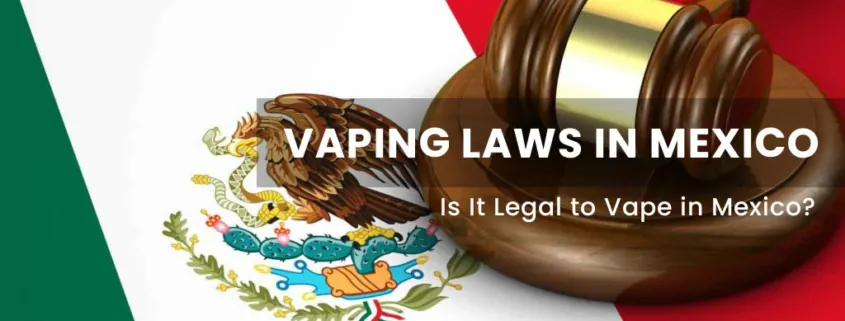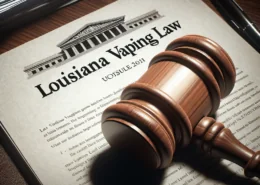Mexico’s Vape Ban Fails to Curb Usage but Incubates Black Market
In a bid to control the usage of electronic cigarettes, Mexico imposed a ban on these devices a year ago. However, despite the government’s efforts, the ban has failed to curb e-cigarette usage among the country’s populace. Local media outlet Excelsior reports that data from the Federal Commission for Protection against Health Risks (COFEPRIS) indicates that a significant number of Mexicans continue to use e-cigarettes, with a concerning number being teenagers. This article explores the persistent usage of e-cigarettes in Mexico and highlights the emergence of a thriving black market as a result of the ban.
According to COFEPRIS, an estimated 5 million Mexicans aged between 12 and 65 have used e-cigarettes, with a staggering 1.7 million of them being teenagers. These numbers indicate that the ban has not effectively deterred individuals from using e-cigarettes. Despite the government’s intentions to protect public health, the prevalence of e-cigarette usage remains a concerning issue.
Ironically, the ban on e-cigarettes has given rise to a thriving black market in Mexico. Illegally sold e-cigarettes are readily available in bustling areas of Mexico City, with prices ranging from 400 to 1,200 pesos ($20-$60 USD), depending on the brand and substance. Some businesses have resorted to online sales through their websites, while others have turned to vending machines in shopping malls, taking advantage of the lack of regulation surrounding these illicit products.
Despite the ban, the circulation of e-cigarettes has continued unabated. A recent report indicates that approximately 45% of teenagers in Mexico are aware of e-cigarettes, and a significant 1.7 million of them are using these devices. Isaac Macip, a spokesperson for COFEPRIS, acknowledged the addictive nature of e-cigarettes, further underscoring the need for effective regulation and control.
Concerned about the omnipresence of e-cigarettes and the associated health risks posed by the black market, Mexican legislator Salomón Chertorivski expressed his apprehension. In March 2023, legislator Sergio Barrera Sepúlveda initiated a proposal calling for comprehensive e-cigarette regulation. Isaac Macip also highlighted the concerted efforts of the national committee, which has seized over 150,000 e-cigarettes nationwide.
President Andrés Manuel López Obrador enacted a decree in May 2022, prohibiting the import and sale of e-cigarettes and heated tobacco products. The rationale behind the ban was the belief that these products pose greater risks than traditional cigarettes. However, the enforcement of this law has been hampered by weak societal management and rampant official corruption. As a result, the ban has not been effectively implemented, allowing e-cigarettes to remain prevalent in various settings, including restaurants, bars, and even outside schools.
Conclusion
Mexico’s ban on e-cigarettes has proven to be ineffective in curbing their usage, with a significant number of Mexicans, including teenagers, continuing to use these devices. Moreover, the ban has inadvertently fostered a thriving black market for e-cigarettes, further exacerbating the challenges faced by authorities. In order to effectively address this issue and protect public health, stringent regulations and robust enforcement mechanisms must be put in place.
FAQs (Frequently Asked Questions)
Are e-cigarettes completely banned in Mexico?
No, e-cigarettes are not completely banned in Mexico. While the government has imposed restrictions on their import and sale, the ban has not been effectively enforced, leading to the widespread availability of these devices.
What are the risks associated with using e-cigarettes?
Using e-cigarettes poses various health risks. They contain addictive stimulants and can lead to nicotine addiction, similar to traditional cigarettes. Additionally, the long-term effects of e-cigarette use are still being studied, but they have been linked to respiratory issues, cardiovascular problems, and potential harm to brain development, particularly in teenagers.
How has the black market for e-cigarettes emerged in Mexico?
The black market for e-cigarettes in Mexico has emerged as a result of the ban on their import and sale. With the prohibition in place, individuals seeking e-cigarettes have turned to illegal channels to obtain these products. Illegally sold e-cigarettes are found in bustling areas, with some businesses resorting to online sales through their websites or using vending machines in shopping malls, taking advantage of the lack of regulation.
What steps are being taken to address the issue of e-cigarette usage in Mexico?
Recognizing the persistent usage and the emergence of the black market, Mexican legislator Sergio Barrera Sepúlveda has initiated a proposal calling for comprehensive e-cigarette regulation. Additionally, the national committee has been coordinating efforts to seize illegal e-cigarettes, resulting in the confiscation of over 150,000 devices nationwide. However, more stringent regulations and effective enforcement are needed to tackle the issue effectively.
What are the challenges faced in enforcing the ban on e-cigarettes in Mexico?
The enforcement of the ban on e-cigarettes in Mexico faces challenges due to weak societal management and rampant official corruption. These factors hinder the effective implementation of the law and contribute to the continued prevalence of e-cigarettes in various settings. Addressing these challenges requires not only stronger enforcement mechanisms but also comprehensive measures to combat corruption and improve governance.
- Bestselling Vapes in UK After Disposable Ban: What to Stock 2025 - August 8, 2025
- Argentina Debates Stricter Vape Laws Amid Prohibition Failures - August 8, 2025
- Nigeria Advocacy Group Urged to Hike Tobacco & Vape Tax by 100% - August 8, 2025









